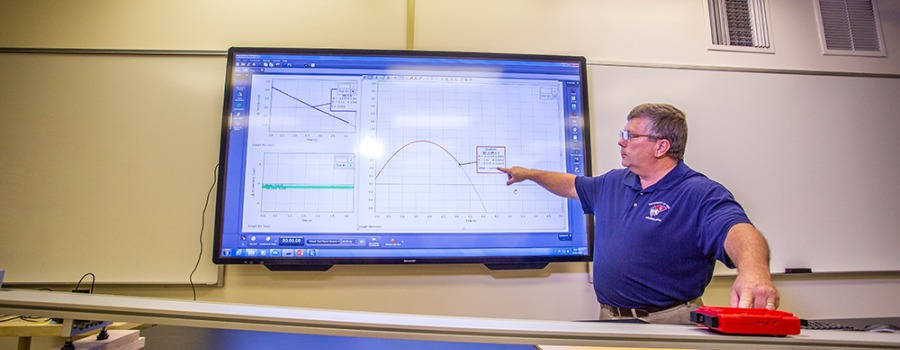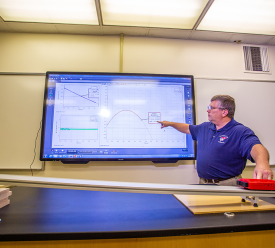The universe is vast and mysterious, but it makes more sense when you understand physics.
If you have a propensity for working with numbers, a curious mind, creativity to think outside the box, and the tenacity it takes to work through problems until you discover a solution, then you're just the kind of person who could do well in the world of physics. Though physics is a complex field, it's a worthwhile one, and it influences a multitude of industries worldwide. By pursuing a bachelor's degree in physics at University of the Cumberlands, you will develop cognitive skills in critical thinking and problem solving, gain a wealth of mathematical knowledge, and explore the professional and ethical responsibilities physicists have toward society.
By the Numbers
$147,450
8%
1 in 5
96%
Programs & Requirements
* The credit hours listed on this page only reference the specific program requirements and is not reflective of the total hours necessary to receive your degree. Cumberlands requires all students obtain a minimum of 60 hours for an associate’s degree and a total of 120 hours for a bachelor’s degree. Transfer and prior learning credits may be counted toward those totals.
To learn more about our General Education Requirements, please visit the page referenced below or explore our Academic Catalog.
Bachelor of Science in Physics
Through a Bachelor of Science in Physics, you will cultivate critical-thinking skills, apply physical principles, develop skills in experimental physics, and extend your math knowledge. As you develop these cognitive skills, you’ll also explore professional and ethical responsibilities to society. Upon graduation, you'll be prepared for entry level positions in a variety of fields, from astronomy, to engineering, to education, and more.
Course Requirements
A Bachelor of Arts degree requires completing the same courses as a Bachelor of Science with the addition of completing one foreign language sequence through the intermediate level.
- FREN 131 Elementary French I
- FREN 132 Elementary French II
- FREN 231 Intermediate French I
- FREN 232 Intermediate French II
- SPAN 131 Elementary Spanish I
- SPAN 132 Elementary Spanish II
- SPAN 231 Intermediate Spanish I
- SPAN 232 Intermediate Spanish II
Minor in Physics
The physics minor is for students to complement their major field of study. Students in mathematics and chemistry will find that physics will strengthen and broaden their understanding of these disciplines and will bolster their critical-thinking and problem-solving skills.
Course Requirements
3+2 Pre-Engineering Partnership with UK
Cumberlands students have the option to pursue the dual-degree (3+2) engineering option, which leads to two bachelor’s degrees through a formal agreement between University of the Cumberlands and the University of Kentucky (UK). Other ABET-accredited engineering schools may be acceptable on a case-by-case basis. Different engineering schools and individual branches of engineering may require different core courses; you, as the student, are responsible for being familiar with these specific requirements and tailoring your class schedule at Cumberlands (and potentially your engineering school of choice during summer semesters) as best you can to meet your goals.
If you want to pursue a dual-degree program, you should announce your Cumberlands major as “Applied Physics,” as that is the degree program which includes the courses that will lay the groundwork best for engineering school.
The 3+2, dual-degree program’s curriculum nominally requires three years at UC followed by two years at UK; however, a variety of situations may affect this timeframe. UC recommends that students complete introductory engineering courses during the summer between UC and UK. Many pre-engineering students are able to complete a bachelor’s degree from Cumberlands and engineering degree from UK in 5 years. Some engineering branches, however, require additional (and maybe extensive) background in programming, chemistry, or biology that are beyond the required curriculum, thus requiring more than five years of schooling to complete the desired engineering degree.
General Education Requirements: For students transferring to University of Kentucky through our 3+2 program, the entire UC general education curriculum should be completed in order to become UK Gen Ed Certified. Students who intend to transfer without completing all of UC’s general education can still be accepted into UK but will have to complete some general education requirements at UK in order to graduate.
Take the Next Step
Program Mission
The Physics Program at Cumberlands strives to prepare students for successful careers in physics, engineering, mathematics, and related fields.
Cultivate critical-thinking skills
Master abstract physical principles
Develop skills in experimental physics
Use mathematics to solve physical problems
Prepare students for careers
Physics Careers & Outcomes
All stats from U.S. Bureau of Labor Statistics
Physicist or Astronomer: $147,450
Physicist or Astronomer: $147,450
Physicists and astronomers study the interactions of matter and energy.
Physics Professor: $86,550
Physics Professor: $86,550
Teach courses pertaining to the laws of matter and energy. Includes both teachers primarily engaged in teaching and those who do a combination of teaching and research.
Mechanical Engineer: $95,330
Mechanical Engineer: $95,330
Mechanical engineers design, develop, build, and test mechanical and thermal sensors and devices.
Nuclear Engineer: $120,380
Nuclear Engineer: $120,380
Nuclear engineers research and develop projects or address problems concerning the release, control, and use of nuclear energy and nuclear waste disposal.
High School Teacher: $61,820
High School Teacher: $61,820
High school teachers teach academic lessons and various skills that students will need to attend college and to enter the job market.
Radiologist: $170,060
Radiologist: $170,060
Diagnose and treat diseases and injuries using medical imaging techniques, such as x rays, magnetic resonance imaging (MRI), nuclear medicine, and ultrasounds. May perform minimally invasive medical procedures and tests.
Common Questions
A physics degree is an academic program that focuses on the study of matter, energy, and the fundamental forces of nature. It involves learning about physical principles, conducting experiments, and applying mathematical and scientific concepts to solve problems in various scientific and engineering contexts.
A bachelor’s degree in physics typically takes four years to complete when studying full-time. This duration includes fulfilling core physics courses, general education requirements, and elective courses.
While some universities offer online courses or components for physics degrees, a full degree program in physics is generally not available entirely online due to the need for hands-on laboratory work. Hybrid programs that combine online coursework with in-person labs might be available.
A physics degree can be worth it if you are interested in pursuing careers in science, engineering, or academia. It provides strong analytical, problem-solving, and mathematical skills that are valuable in many high-tech and research-oriented fields. The degree can also lead to higher earning potential and various career opportunities.
With a physics degree, you can pursue careers such as physicist or astronomer, physics professor, mechanical engineer, nuclear engineer, high school teacher, and radiologist. These roles involve studying physical phenomena, teaching, engineering design, and medical imaging.
To obtain a physics degree, you need to enroll in an accredited program offering a Bachelor of Science in Physics. You'll need to complete coursework in physics, mathematics, and related subjects, along with laboratory work and possibly a research project or thesis.
Yes, physics degrees can lead to well-paying careers. For example, physicists and astronomers earn an average salary of $147,450, mechanical engineers earn $95,330, and nuclear engineers earn $120,380. Salaries can vary based on the specific role and industry.
A physics degree typically requires around 54 credits specific to the major. In addition, you need to meet general education requirements, bringing the total to approximately 120 credits for the degree.
Physics studies include topics such as classical mechanics, electromagnetism, quantum mechanics, thermodynamics, optics, and relativity. Students also engage in experimental physics, mathematical methods, and applications of physical principles to solve complex problems.
Faculty Experts in Physics
Learn more about your future physics professors!

Amy Bowman

Debbie Pierce

Kenny Siler
Kenny Siler
Contact Information
Request Information
Still need some more information about our physics program or about Cumberlands in general? Ask away!

